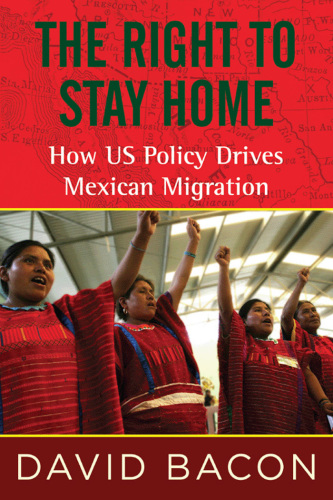
The Right to Stay Home
How US Policy Drives Mexican Migration
کتاب های مرتبط
- اطلاعات
- نقد و بررسی
- دیدگاه کاربران
نقد و بررسی

April 1, 2013
Bacon (Illegal People), a labor organizer, immigrant-rights activist, and journalist, describes the factors that drive Mexican migrants across the border and into the U.S. These include the economic effects of NAFTA, environmental degradation, health hazards, anti-union policies, and, above all, low wages and poverty. As Bacon notes, 95% of the jobs created in Mexico in 2010 pay around $10 per day. He also examines the harsh conditions many Mexican migrants face in the U.S., such as the criminalization of undocumented immigration (whereas previously, undocumented immigrants were allowed to return to Mexico voluntarily) and the economic exploitation of short-term agricultural “guest” workers. By providing billions in remittances to Mexico while increasing U.S. corporations’ profits, Mexican migrants serve the interests of both countries, Bacon observes. In a concluding chapter, he offers a number of ideas for reform, including giving migrant workers green cards instead of work-based visas and renegotiating trade agreements to eliminate the causes of Mexican workers’ displacement. Bacon’s book, which is enhanced by 11 personal narratives, will help readers gain a significantly more sophisticated understanding of the context and on-the-ground reality of undocumented migrants in the U.S.

July 15, 2013
Compelling examination of Mexican immigration to the United States, both legal and illegal. Since the 1990s and the implementation of NAFTA, writes Bacon (Illegal People: How Globalization Creates Migration and Criminalizes Immigrants, 2008, etc.), the rural poverty rate in Mexico has risen to as high as 55 percent, with close to 13 million Mexicans living and working in the U.S. Such numbers indicate that looking to the U.S. for work and survival is not a choice but a necessity; "poverty," writes the author, "is the real recruiter." As foreign corporations, especially American, come to dominate the Mexican economy, Mexican unemployment has continued to soar. Small, sustainable agriculture has been unable to compete with foreign-owned agribusiness, and in the industrial sector, progressive unions have been crushed by a Mexican government all too eager to acquiesce to corporate needs, leaving hundreds of thousands unemployed. On the other side of the border, Mexican workers find increasing hostility to their presence, with ever-more-draconian measures against those here illegally and harsh exploitation of those her legally. But Bacon's study is more than an account of the conditions that create such a situation. He also reports on resistance to this situation, from massive demonstrations in Mexico to union-organizing efforts of Mexican workers in the U.S. to cross-border coalitions among labor, African-American and other minorities, Mexican workers, and even the Occupy movement. In addition, he provides chapters in which Mexican emigre workers speak directly about their experiences and ordeals. At times, Bacon's narrative becomes overly detailed and thus difficult to follow, yet his overall theme is clear: Immigration reform means reform of an economic system that benefits corporations and forces Mexican workers to leave home. An important contribution to the current immigration debate.
COPYRIGHT(2013) Kirkus Reviews, ALL RIGHTS RESERVED.

























دیدگاه کاربران